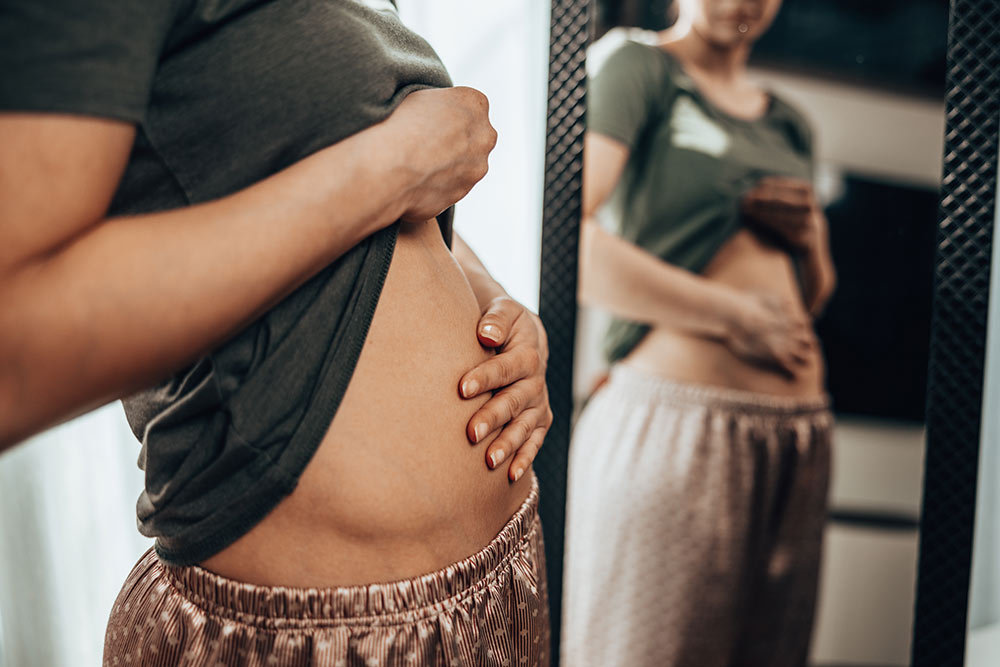Pregnancy and Eating Disorders

For some, the steady weight gain and changes in appearance during pregnancy create feelings of fear, panic, and anxiety.
Expert: Elizabet Altunkara, LMSW, SIFI
With pregnancy comes dramatic body changes, from a growing belly to swollen hands to skin conditions and more. These changes can challenge anyone’s body image, but this is especially true for someone who is battling or who has recovered from an eating disorder.
The National Eating Disorders Association (NEDA) estimates that 20 million women and 10 million men will be diagnosed with an eating disorder at some point in their lifetime, whether it’s anorexia nervosa, bulimia nervosa, binge eating disorder, orthorexia, compulsive exercise, or another diagnosis.
Eating disorders are incredibly complex, and it takes tremendous strength and determination to seek and receive treatment. The cravings, weight gain, body changes, and pressure to stick to a “healthy diet” during pregnancy can throw off the delicate balance of eating disorder treatment and recovery—and it’s something we aren’t talking about nearly enough.
Effects of Eating Disorders in Pregnancy and Postpartum
NEDA recommends that anyone with an eating disorder—whether thoughts or behaviors—wait until they are in a place of recovery before trying to get pregnant. This is because not only is eating a well-balanced diet important during pregnancy, but it’s also equally important in the months leading up to conception.
In addition to the nutritional challenges that accompany pregnancy with an eating disorder, there are also psychological and mental health struggles to consider.
“Since pregnancy involves major changes in a woman’s life and body, this is a challenging time for those who are struggling with eating disorders and body image,” says Elizabet Altunkara, LMSW, SIFI, director of education at NEDA. She adds, “Some who are in recovery may relapse during pregnancy, others who were already struggling prior to getting pregnant may experience an increase in the severity of their symptoms.”
All of this being said, it’s important to note that not everyone who suffers from disordered eating or body image issues will worsen or relapse during pregnancy. One study found that pregnancy actually improved symptoms in some people. However, once the baby was born, many people revert back to disordered eating behaviors in the postpartum period, presumably as a means to return to their pre-pregnancy body weight.
How Does an Eating Disorder Affect an Unborn Child and the Parent?
As we all know, pregnancy isn’t always planned, so it’s not unheard of for someone to find themselves expecting while they’re still struggling with or in treatment for an eating disorder. Similarly, as Altunkara mentions, even if a person is in a good place with their disordered eating, pregnancy (planned or not) can easily push them out of recovery.
When this happens, Altunkara says it is incredibly important to work with a health care provider who is equipped to help in a way that is supportive and sensitive to the situation. In order for this to happen, though, the patient needs to openly tell their provider that they either are currently struggling or have struggled in the past with disordered eating. Not only will this allow the provider to give the patient the best possible prenatal care, but it will also prompt them to monitor the baby more closely than they might for a patient who is not struggling with disordered eating.
Left untreated, eating disorders during pregnancy can result in serious issues for the unborn baby. According to Altunkara, “Risks for the baby include poor development, premature birth, low birth weight, respiratory distress, feeding difficulties, and other perinatal complications.” Additionally, though more research is needed, some studies have found links between eating disorders and miscarriage.
Disordered eating during pregnancy also poses risks to the pregnant parent. For someone with bulimia, for example, pregnancy increases the risk of dehydration (particularly from purging), cardiac problems, and chemical imbalances. Patients struggling with binge eating disorders are at a higher risk of developing gestational diabetes and/or high blood pressure. These are complications that a provider will want to be on the lookout for, but they have to be aware of what’s going on in order to provide the best possible care.
How Are Eating Disorders Treated During Pregnancy?
You may have heard stories of intense inpatient treatment centers for people seeking help for eating disorders, but this is not the only treatment option available. There are other ways to address disordered eating, many of which may be better suited for someone who is experiencing this kind of high-risk pregnancy.
According to Altunkara, “A combination of nutritional counseling, therapy, and medical monitoring is necessary to protect the health of the mother and the baby throughout pregnancy.”
How often a patient will need to attend counseling sessions, meet with a dietitian or nutritionist, and set medical appointments will depend on their specific situation, but these check-ins should be on a regular basis regardless of the intervals.
Additionally, Altunkara notes that a good support system is another key to successful eating disorder treatment during pregnancy, whether it’s in the form of a group therapy program or with family members and friends (in some cases, it might be both).
Coping With an Eating Disorder During Pregnancy
According to Altunkara, the best way for someone with an eating disorder to cope during pregnancy is to be open and honest with your provider (and ideally with friends and family) about what they’re going through. She also stresses the importance of finding a care team that is experienced in helping patients with these concurring conditions. These specialized providers will know how to be extra sensitive to the situation while still ensuring both the patient and the baby are getting what they need in order to be healthy.
To avoid triggers, patients can ask their health care provider and staff not to share belly measurements or their weight unless it is absolutely crucial. And if it becomes necessary for the provider to discuss these topics, patients can request that numbers be kept vague to avoid hyperfocus that can lead to obsession.
Finally, Altunkara explains that counseling should continue throughout pregnancy and postpartum because there will still be a lot to cope with once the baby has been delivered. In fact, one study found that 11.5% of women between three to seven months postpartum exhibited symptoms of disordered eating. “Counseling during and after pregnancy can also help someone cope with concerns and fears regarding food, weight gain, body image, and the new role of parenting,” she says.
Managing a healthy pregnancy with an eating disorder is incredibly difficult, but there are professionals who can help you navigate this challenging situation. Visit NEDA’s Help and Support page to find treatment options in your area.








